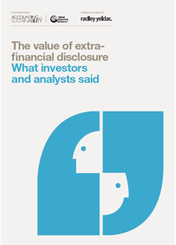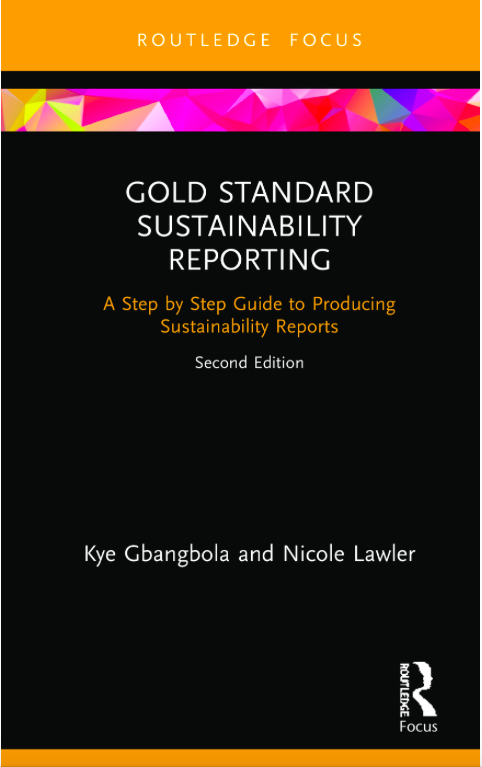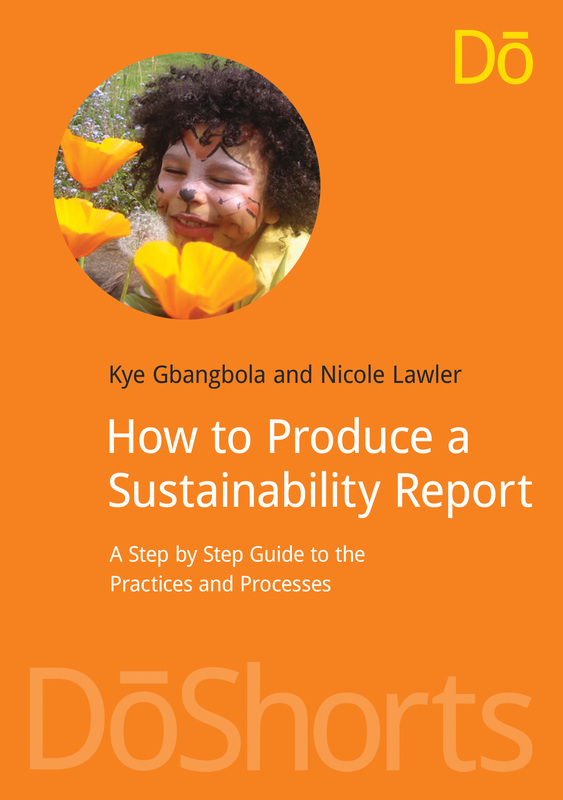
The report shows that extra-financial information – such as disclosures on governance and environmental issues – has become an important and influential consideration for investors and analysts.
Key research findings include:
- governance information is the most relevant type of extra-financial information for investors and analysts, with 70% of respondents rating it very relevant
- 64% of respondents said information on natural resources is very relevant to their analyses of companies
- 52% say social and community information is very relevant
- Comparability of extra-financial information between companies is an issue: 61% said they find social information difficult to compare and 41% said they find environmental information difficult to compare, while only 3% said they find it difficult to compare financial information between companies
- Over 80% of investors and analysts believe that integrated reporting will deliver benefits to their analysis or company assessments
- Nearly half of investors and analysts (46%) state that direct engagement with the CEO or CFO on extra-financial issues is very likely to influence their investment decisions or company analysis, slightly more so than other corporate reporting channels such as the sustainability report, annual report or integrated report
- Voluntary frameworks for reporting extra-financial information play an important role in decision-making and company analysis, especially the GRI Sustainability Reporting Framework and the Carbon Disclosure Project
Download the publication here
Research partners the Global Reporting Initiative (GRI) and The Prince of Wales’s Accounting for Sustainability Project (A4S), in collaboration with Radley Yeldar, say the research provides new insight into how financial markets source, use and are influenced by extra-financial information.
The value of extra-financial disclosure
According to the report What Investors and Analysts Said, extra-financial information – such as disclosures on governance and environmental issues – has become an important and influential consideration for investors and analysts.
Sarah Nolleth, A4S Project Director, said, “We are delighted to see that the investor community is increasingly seeking extra-financial information as part of their decision-making processes. The increased credibility of, and demand for, these sources of information will help sustainability considerations become embedded into investors’ assessments of a company’s long-term value. The report highlights the importance of Integrated Reporting, but it is important to remember that companies also need Integrated Thinking i.e. embedding sustainability into their decision-making and strategy, as the precursor to successful Integrated Reporting”
According to the survey results, governance information is the most relevant type of extra-financial information for investors and analysts, with 70 percent of respondents rating it very relevant, while 64 percent of respondents said information on natural resources is very relevant to their analyses of companies. Social and community information ranks lower, although 52 percent of respondents say such information is very relevant.
The relatively low relevance of social and community information could, the researchers say, be due to the difficulty in comparing company performance on these issues. 61 percent of investors and analysts surveyed said they find social information difficult to compare; whereas only 41 percent said the same for environmental information. In contrast, only three percent of respondents said they find it difficult to compare financial information.
Nelmara Arbex, Deputy Chief Executive of the Global Reporting Initiative (GRI), said: “This research is one more piece of evidence showing how organizational disclosure on sustainability impacts is popular among investors. GRI expects the demand for sustainability performance related information to increase and sustainability reporting to become standard practice. GRI’s guidance will continue to offer companies globally recognized support to improve their sustainability reporting practice, and prepare more focused reports. This is the performance data we are all looking for.”
Preferred sources and formats for extra-financial information
The research also investigated preferred communication channels and formats for receiving extra-financial information.
A key finding was that investors and analysts use a wide range of sources to gather financial and extra-financial information. However, some channels – notably PDF format publications – were more popular than others for certain types of financial and extra-financial information.
Ben Richards, Head of Sustainability at communication specialist Radley Yeldar comments:
“This research demonstrates that investors and analysts rely on tried and tested channels of communication – namely reporting and dialogue with companies – though this tends to be part of a blended approach to information gathering. If they need specific details, they’ll use specialist sources. This means reporters need to clearly guide these audiences through their disclosure, which often appears in a number of places on their corporate websites.”
Richards goes on to say:
“The research also highlights the need for reporters to reconsider interactive online reports such as dedicated microsites, which appear to be less valued by investor and analyst audiences than a PDF report. We believe there’s still a role for online channels to deliver relevant information, but reporters need to better understand their audience’s needs, and the role of the various pieces of disclosure they issue, to communicate their story as clearly as possible.”
Other key findings from the research include:
- Over 80% of investors and analysts believe that integrated reporting will deliver benefits to their analysis or company assessments
- Nearly half of investors and analysts (46%) state that direct engagement with the CEO or CFO on extra-financial issues is very likely to influence their investment decisions or company analysis, slightly more so than other corporate reporting channels such as the sustainability report, annual report or integrated report
- Voluntary frameworks for reporting extra-financial information play an important role in decision-making and company analysis, especially The GRI Sustainability Reporting Framework and the Carbon Disclosure Project
-Ends-
| Global Reporting Initiative Lucy Goodchild, Press & Communications Manager Tel: +31 (0)20 531 0067 Out of office hours: +31 (0)6 303 99 531 Email: [email protected] | The Prince’s Accounting for SustainabilityProject (A4S) Bethan Walker Communications Officer Email: [email protected] |
1. About the survey
Between March and September 2011 Radley Yeldar surveyed a sample of 34 investors and 35 analysts. Overall 68% of the sample self declared themselves as working primarily in the Socially Responsible Investment (SRI) field with the remainder identifying themselves as non-SRI. Just over half of the investor sample (56%) identified themselves as working in the SRI field compared to 80% of analysts who said the same.
Over half of those participating in our survey had a global remit, supported by regional investment or research specialisms.
We asked our sample 35 questions on a range of topics related to how investors and analysts source, use and are influenced by extra-financial information, in particular:
- How they source extra-financial information and their preferred formats for the presentation of this information
- The influence and credibility of these sources and formats from an investment decision-making and company assessment perspective
- The ease of comparability of extra-financial information between companies
- The usefulness and potential benefits of integrated reporting
- The effectiveness of regulatory and voluntary frameworks in increasing the usefulness of extra-financial information
- The importance and influence of positive and limited assurance statements
For the purpose of this research, extra-financial information is defined as incorporating a wide range of issues which are likely to have a short, medium or long-term effect on business performance. Extra-financial issues typically exist beyond the traditional range of variables that are considered as part of investment decision-making processes.
Extra-financial factors include, but are not limited to, corporate governance, intellectual capital management, human rights, occupational health and safety and human capital practices, innovation, research and development (R&D), customer satisfaction, climate change and natural resource management, consumer and public health, reputation risk, and the broader environmental and social impacts of corporate activity such as biodiversity impacts and community impacts.
3. About The Prince’s Accounting for Sustainability Project
Established in 2004 by His Royal Highness The Prince of Wales, A4S works with businesses, investors, the public sector, accounting bodies, NGOs and academics to develop practical guidance and tools for embedding sustainability into decision-making and reporting processes. The Prince’s Accounting for Sustainability Project has been instrumental in the formation of the International Integrated Reporting Council (IIRC).
Website: http://www.accountingforsustainability.org/
4. About the Global Reporting Initiative
The Global Reporting Initiative (GRI) produces a comprehensive Sustainability Reporting Framework that is widely used around the world, to enable greater organizational transparency. The Framework, including the Reporting Guidelines, sets out the Principles and Indicators organizations can use to report their economic, environmental, and social performance. GRI is committed to continuously improving and increasing the use of the Guidelines, which are freely available to the public.
Website: http://www.globalreporting.org/
5. About Radley Yeldar
Radley Yeldar is a London-based creative communications business that helps its clients tell their story simply, in one clear voice, by whatever means works best. Radley Yeldar’s dedicated financial and sustainability reporting specialists have clients in the UK, Europe and North America, and have helped to shape the reporting landscape through their advice and thought leadership projects (namely the well-established How Does It Stack Up? best practice research report) since 1986.
Website: http://www.ry.com/















 RSS Feed
RSS Feed
